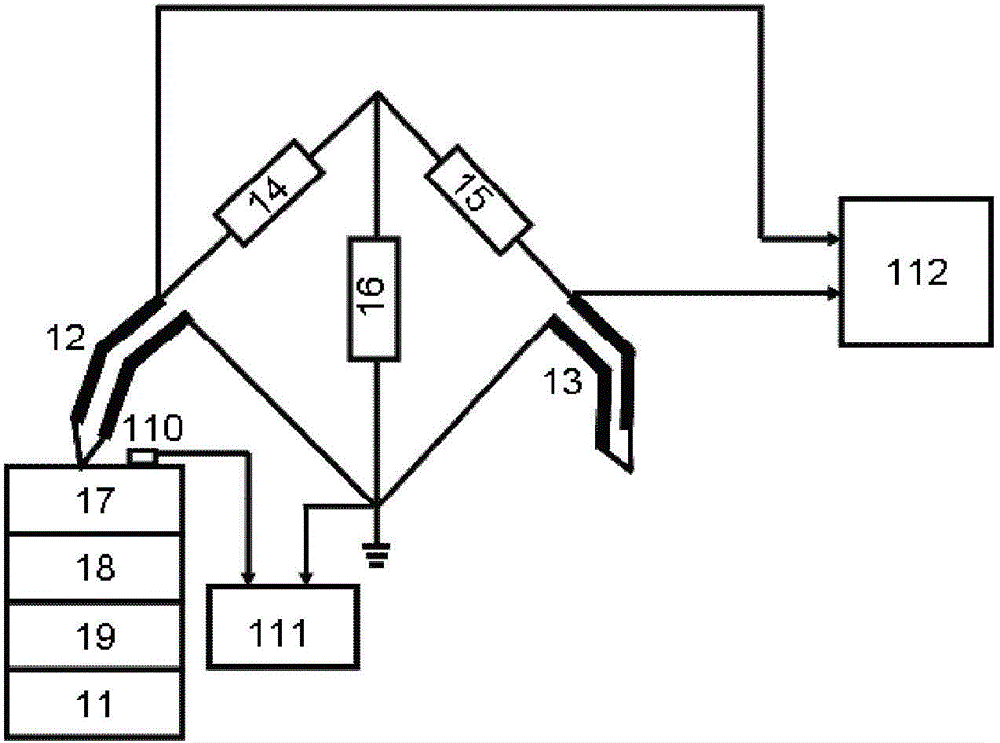A device for in-situ quantitative characterization of nano-thermoelectric Seebeck coefficients based on atomic force microscope
An atomic force microscope and Seebeck coefficient technology, which can be used in measurement devices, nanotechnology, scanning probe microscopy, etc. Problems such as measurement, difficulty in realizing potential difference measurement, etc.
- Summary
- Abstract
- Description
- Claims
- Application Information
AI Technical Summary
Problems solved by technology
Method used
Image
Examples
Embodiment 1
[0042] The micro-region Seebeck coefficient of the Bi-Sb-Te thermoelectric thin film was tested by using the nano-thermoelectric Seebeck coefficient in-situ quantitative characterization device established in this application, and Fig. 7 shows the test results. Among them, Fig. 7 (a) is the double frequency signal (V 2ω ) test results; Figure 7(b) shows the three-frequency signal of the micro-area under different excitation voltages (V 3ω ) test results; Figure 7(c) is the curve made according to the double-frequency signal in Figure (a) and the triple-frequency signal in Figure (b), and the Seebeck coefficient of the micro-area can be calculated according to the slope of the linear part, that is, S =V 2ω / V 3ω =140.01μV / K, which is very close to the macroscopic test result of the film S=138μV / K, indicating the feasibility of the micro-seebeck quantitative characterization device and the accuracy of the results.
Embodiment 2
[0044] The in-situ quantitative characterization device for nano-thermoelectric Seebeck coefficients established in this application was used to test the micro-region Seebeck coefficients of a thermoelectric material. Figure 8 Test results at an alternating frequency of 200 Hz are shown. According to the slope of its linear part, the Seebeck coefficient of the micro-area can be calculated as S=50.49μV / K. This value is very close to the macroscopic test result S=50μV / K of the film, further indicating the feasibility and accuracy of the micro-area Seebeck quantitative characterization technique.
[0045] The above examples show that the new method for in-situ quantitative characterization of nanothermoelectric Seebeck coefficients based on atomic force microscopy solves the key technical problem of in-situ quantitative characterization of nanothermoelectric Seebeck coefficient parameters without directly measuring temperature changes. The new nanometer characterization device ...
PUM
 Login to View More
Login to View More Abstract
Description
Claims
Application Information
 Login to View More
Login to View More - R&D
- Intellectual Property
- Life Sciences
- Materials
- Tech Scout
- Unparalleled Data Quality
- Higher Quality Content
- 60% Fewer Hallucinations
Browse by: Latest US Patents, China's latest patents, Technical Efficacy Thesaurus, Application Domain, Technology Topic, Popular Technical Reports.
© 2025 PatSnap. All rights reserved.Legal|Privacy policy|Modern Slavery Act Transparency Statement|Sitemap|About US| Contact US: help@patsnap.com



